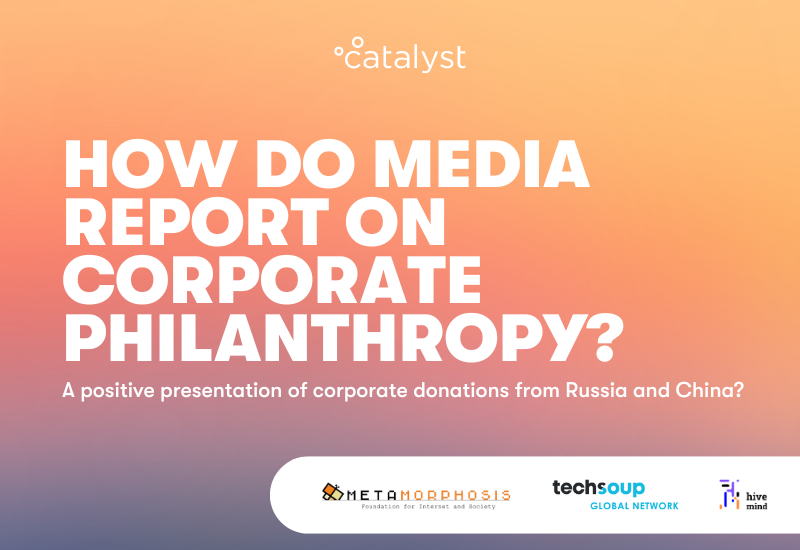The corporate philanthropy of companies from Russia and China on the one hand, and Europe on the other, is not portrayed in the same way in the Serbian media. An analysis of media sentiment applied to 2,476 articles on corporate philanthropy by a group of 38 companies shows that donations from companies from Russia and China are written more positively compared to donations from companies from Europe.
We took media releases from the press clipping database on philanthropy about corporate donations of 19 largest companies from Russia and China, as well as 19 largest companies from Europe operating in Serbia, in the period from 01/01/2023 to 31/12/2023. In total, we found 2,476 media articles that had as a topic donations by the mentioned companies. Of these, 646 articles were related to donations from Russian and Chinese companies, and 1,830 articles were related to donations from European companies.
Graph 1: Total number of identified media articles
Sentiment analysis of media articles was conducted using an AI model that classified articles as having positive, neutral, or negative sentiments.
The model classified 74.8% of all texts as having positive sentiment, 6% as neutral, and 19.2% as having negative sentiment. Bearing in mind that the topic of these texts is corporate philanthropy, the dominant share of positive sentiment in media coverage is expected, which accounts for three-quarters of the total number of articles.
Graph 2: Number of media articles by sentiment
When the number of articles with different media sentiment is compared with the total number of articles by groups of companies, we get a similar picture: in both cases the media coverage is predominantly written with positive sentiments about corporate philanthropy. However, the difference is that the media report on Russian and Chinese companies more often in a more positive tone and slightly less often in a negative tone, compared to companies from Europe (80% vs. 73%, and 13% vs. 21%, respectively).
Graphs 3 & 4: Media articles sentiment for companies from Russia and China, media articles sentiment for companies from Europe
This is not due to coincidence, as there is a statistically significant difference (p<0.01) in how the philanthropy of Russian and Chinese companies is reported on the one hand, and European companies on the other. In other words, the philanthropy of Russian and Chinese companies is structurally more often described by the media in a positive light than is the case with European companies.
We Need Uniform Reporting
Politically, Serbia is still in a political position between East and West. On the one hand, it has publicly proclaimed its desire to join the EU, and on the other hand, it still nurtures close political relations with the Russian Federation and the People's Republic of China. Such a political balancing act can create confusion among citizens and reduce support for European integration.
There is a feedback loop between media reporting and public opinion: the media report what people want to know, but they also have an impact on the formation of public opinion through their content. That is why it is so important that philanthropy, including corporate philanthropy, is written about in a quality and balanced way. It is in this light that the results of this research should be considered.
Uneven media coverage can have negative consequences for the development of corporate philanthropy, as it reduces the incentive for companies to help the community through corporate social responsibility programs. Also, a more negative presentation of corporate philanthropy from European countries, according to the principle of joint judgments, can influence the creation of more negative attitudes towards the West, more precisely the EU or individual European countries, and thus reduce support for Serbia's membership in the EU and the processes of social reforms that are its prerequisite.
In public opinion polls, it is often the case that the perception of the closeness of political relations is transferred according to the principle of joint judgments to other important details of international cooperation between states. Thus, China and Russia are often at the top of the donor countries to Serbia in public opinion, although the donations of these countries have not been recorded in significant amounts at all. It is because of these tendencies that it is important to have a responsible, accurate and impartial portrayal of philanthropy in the media.
Download the full report in .pdf
This research is supported through the Digital Activism Program by Tech Soup Global.


Leave a comment